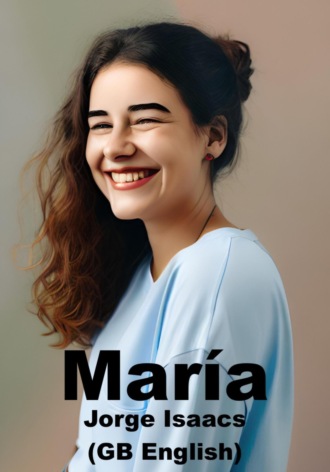
Jorge Isaacs
Maria (GB English)
–Choto! he shouted; and soon a half-naked little black man, cute sultanas, and a dry, scarred arm, appeared.
–Take that horse to the canoe and clean the sorrel colt for me.
And turning to me, having noticed my horse, he added:
–Carrizo with the retinto!
–How did that boy's arm break down like that? -I asked.
–They're so rough, they're so rough! He's only good for looking after the horses.
Soon they began to serve lunch, while I was with Doña Andrea, Emigdio's mother, who almost left her kerchief without fringes, for a quarter of an hour we were alone talking.
Emigdio went to put on a white jacket to sit down at the table; but first he presented us with a black woman adorned with a Pastuzean cape with a handkerchief, wearing a beautifully embroidered towel hanging from one of her arms.
The dining room served as our dining room, whose furnishings were reduced to old cowhide couches, some altarpieces representing saints from Quito, hung high up on the not very white walls, and two small tables decorated with fruit bowls and plaster parrots.
The truth be told, there was no greatness at lunch, but Emigdio's mother and sisters were known to understand how to arrange it. The tortilla soup flavoured with fresh herbs from the garden; the fried plantains, shredded meat and cornmeal doughnuts; the excellent local chocolate; the stone cheese; the milk bread and the water served in big old silver jugs, left nothing to be desired.
When we were having lunch, I caught a glimpse of one of the girls peeping through a half-open door; and her cute little face, lit up by eyes as black as chambimbes, suggested that what she was hiding must be very much in harmony with what she was showing.
I said goodbye to Mrs. Andrea at eleven o'clock, because we had decided to go to see Don Ignacio in the paddocks where he was rodeoing, and to take advantage of the trip to take a bath in the Amaime.
Emigdio stripped off his jacket and replaced it with a threaded ruana; he took off his sock boots to put on worn-out espadrilles; he fastened some white tights of hairy goat skin; he put on a big Suaza hat with a white percale cover, and mounted the sorrel, first taking the precaution of blindfolding him with a handkerchief. As the colt curled up into a ball and hid his tail between his legs, the rider shouted at him: "You're coming with your trickery!" immediately unloading two resounding lashes with the Palmiran manatee he was wielding. So, after two or three corcovos, which did not even move the gentleman in his Chocontan saddle, I mounted and we set off.
As we reached the site of the rodeo, distant from the house more than half a league, my companion, after he had taken advantage of the first apparent flat to turn and scratch the horse, entered into a tug-of-war conversation with me. He unpacked all he knew about the matrimonial pretensions of Carlos, with whom he had resumed friendship since they met again in the Cauca.
–What do you say? -he ended up asking me.
I slyly dodged an answer; and he went on:
–What's the use of denying it? Charles is a working lad: once he is convinced that he can't be a planter unless he lays aside his gloves and umbrella first, he must do well. He still makes fun of me for lassoing, and making a fence, and barbequing mule; but he's got to do the same or go bust. Haven't you seen him?
–No.
–Do you think he doesn't go to the river to bathe when the sun is strong, and if they don't saddle his horse he won't ride, just so he won't get a tan and get his hands dirty? As for the rest, he's a gentleman, that's for sure: it wasn't eight days ago that he got me out of a jam by lending me two hundred patacones that I needed to buy some heifers. He knows he doesn't let it go to waste; but that's what you call serving in time. As for his marriage… I'll tell you one thing, if you offer not to scorch yourself.
–Say, man, say what you want.
–In your house they seem to live with a great deal of tone; and it seems to me that one of those little girls brought up among soots, like the ones in fairy tales, needs to be treated like a blessed thing.
He laughed and continued:
–I say that because that Don Jerónimo, Carlos's father, has more shells than a siete-cueros, and he's as tough as a chili pepper. My father can't see him since he's got him involved in a land dispute and I don't know what else. The day he finds him, at night we have to put some yerba mora ointment on him and give him a rub of aguardiente with malambo.
We had arrived at the rodeo site. In the middle of the corral, in the shade of a guásimo tree and through the dust raised by the moving bulls, I discovered Don Ignacio, who approached me to greet me. He was riding a pink and coarse quarter horse, harnessed with a tortoiseshell whose lustre and decay proclaimed his merits. The meagre figure of the rich owner was decorated as follows: shabby lion's pauldrons with uppers; silver spurs with buckles; an unplacked jacket of cloth and a white ruana overloaded with starch; crowning it all was an enormous Jipijapa hat, the kind they call when the wearer gallops: Under its shadow, Don Ignacio's big nose and small blue eyes played the same game as in the head of a stuffed paletón, the garnets that he wears for pupils and the long beak.
I told Don Ignacio what my father had told me about the cattle they were to fatten together.
–He replied, "It's all right," he said, "You can see that the heifers can't get any better: they all look like towers. Don't you want to come in and have some fun?
Emigdio's eyes were going wild watching the cowboys at work in the corral.
–Ah tuso! -he shouted; "beware of loosening the pial.... To the tail! To the tail!
I excused myself to Don Ignacio, thanking him at the same time; he continued:
–Nothing, nothing; the Bogotanos are afraid of the sun and the fierce bulls; that's why the boys are spoiled in the schools there. Don't let me lie to you, that pretty boy, son of Don Chomo: at seven o'clock in the morning I met him on the road, bundled up with a scarf, so that only one eye was visible, and with an umbrella!.... You, as far as I can see, don't even use such things.
At that moment, the cowboy shouted, with the red-hot brand in his hand, applying it to the paddle of several bulls lying and tied up in the corral: "Another… another".... Each of these shouts was followed by a bellow, and Don Ignacio would use his penknife to make one more notch on a guasimo stick that served as a foete.
As the cattle could be dangerous when they got up, Don Ignacio, after having received my farewell, got to safety by going into a neighbouring corral.
Emigdio's chosen spot on the river was the best place to enjoy the bathing that the waters of the Amaime offer in the summer, especially at the time we reached its banks.
Guabos churimos, on whose flowers fluttered thousands of emeralds, offered us dense shade and cushioned leaf litter where we spread out our ruanas. At the bottom of the deep pool that lay at our feet, even the smallest pebbles were visible and silver sardines frolicked. Down below, on the stones that were not covered by the currents, blue herons and white egrets fished peeping or combed their plumage. On the beach in front, beautiful cows were lying on the beach; macaws hidden in the foliage of the cachimbo trees were chattering in a low voice; and lying on the high branches, a group of monkeys slept in lazy abandonment. The cicadas were everywhere resounding their monotonous songs. A curious squirrel or two peeped through the reeds and disappeared swiftly. Further into the jungle we heard from time to time the melancholy trill of the chilacoas.
–Hang your tights away from here," I said to Emigdio, "or else we'll come out of the bath with a headache.
He laughed heartily, watching me as I placed them on the fork of a distant tree:
–Do you want everything to smell like roses? The man must smell like a goat.
–Surely; and to prove that you believe it, you carry in your tights all the musk of a goatherd.
During our bath, whether it was the night and the banks of a beautiful river that made me feel inclined to confide in him, or whether it was because I had given myself traces for my friend to confide in me, he confessed to me that after having kept the memory of Micaelina as a relic for some time, he had fallen madly in love with a beautiful ñapanguita, a weakness that he tried to hide from the malice of Don Ignacio, since the latter would try to thwart him, because the girl was not a lady; And in the end he reasoned thus:
–As if it could be convenient for me to marry a lady, so that I should have to serve her instead of being served! And gentleman as I am, what on earth could I do with a woman of that sort? But if you knew Zoila? Man! I don't weary you; you'd even make verses of her; what verses! your mouth would water: her eyes could make a blind man see; she has the slyest laugh, the prettiest feet, and a waist that....
–Slowly," I interrupted him: "You mean you're so frantically in love that you'll drown if you don't marry her?
–I'm getting married even if the trap takes me!
–With a woman of the village? Without your father's consent? I see: you are a man of beards, and you must know what you are doing. And has Charles any news of all this?
–God forbid! God forbid! In Buga they have it in the palms of their hands and what do you want in their mouths? Fortunately Zoila lives in San Pedro and only goes to Buga every few days.
–But you would show it to me.
–It's a different matter for you; I'll take you any day you like.
At three in the afternoon I parted from Emigdio, apologising in a thousand ways for not eating with him, and four o'clock would be when I got home.
Chapter XX
My mother and Emma came out into the corridor to meet me. My father had ridden out to visit the works.
Soon after I was called to the dining-room, and I did not delay in going, for there I expected to find Maria; but I was deceived; and as I asked my mother for her, she answered me:
As the gentlemen are coming to-morrow, the girls are busy making some sweets, and I think they have finished them, and will come now.
I was about to get up from the table when José, who was coming up from the valley to the mountain herding two mules loaded with cane-brava, stopped on the high ground overlooking the interior, and shouted at me:
–Good afternoon! I can't get there, because I'm carrying a chúcara, and it's getting dark. I'll leave you a message with the girls. Be very early to-morrow, for the thing is sure to happen.
–Well," I replied, "I'll come very early; say hello to everybody.
–Don't forget the pellets!
And waving his hat at me, he continued up the stairs.
I went to my room to prepare the shotgun, not so much because she needed cleaning as because I was looking for an excuse not to stay in the dining room, where at last Maria did not show up.
I had a box of pistons open in my hand when I saw Maria coming towards me, bringing me the coffee, which she tasted with the spoon before she saw me.
The pistons spilled all over the floor as soon as it came near me.
Without resolving to look at me, she bade me good evening, and placing the saucer and cup on the rail with an unsteady hand, she searched for an instant with cowardly eyes for mine, which made her blush; and then, kneeling down, she began to pick up the pistons.
–Don't do that," I said, "I'll do it later.
–I have a very good eye for small things," he replied; "let's see the little box.
He reached out to meet her, exclaiming at the sight of her:
–Oh, they've all been watered!
–It wasn't full," I observed, helping him.
–And that you need these tomorrow," he said, blowing the dust off the ones he held in the rosy palm of one of his hands.
–Why tomorrow and why these?
–Because, as this hunt is dangerous, I think that to miss a shot would be terrible, and I know from the little box that these are the ones the doctor gave you the other day, saying they were English and very good.....
–You hear everything.
–I would sometimes have given anything not to hear. Perhaps it would be better not to go on this hunt.... José left you a message with us.
–Do you want me not to go?
–And how could I demand that?
–Why not?
He looked at me and did not answer.
–I think there is no more," said he, rising to his feet, and looking at the floor around him; "I am going. The coffee will be cold by this time.
–Try it.
–But don't finish loading that shotgun now..... It's good," he added, touching the cup.
–I'll put the gun away and take it; but don't go away.
I had gone into my room and come out again.
–There's a lot to do in there.
–Oh, yes," I replied, "preparing desserts and galas for tomorrow, so you're leaving?
He made a movement with his shoulders, at the same time tilting his head to one side, which meant: as you wish.
–I owe you an explanation," I said, approaching her. Do you want to hear me?
–Didn't I say there are things I wouldn't want to hear? -he replied, rattling the pistons inside the box.
–I thought that what I…
–It is true what you are going to say; what you believe.
–What?
–That I should hear you; but not this time.
–You must have thought badly of me these days!
She read, without answering me, the signs on the cash register.
–I will tell you nothing, then; but tell me what you have supposed.
–What's the point?
–You mean you won't allow me to apologise to you either?
–What I should like to know is, why you have done that; but I am afraid to know, for I have given no reason for it; and I always thought you had some that I should not know..... But as you seem to be glad again – I am glad too.
–I don't deserve you to be as good as you are to me.
–Perhaps it is I who do not deserve....
–I have been unjust to you, and if you would allow it, I would ask you on my knees to forgive me.
His long-veiled eyes, shone with all their beauty, and he exclaimed:
–Oh, no, my God! I've forgotten everything… do you hear well? everything! But on one condition," he added after a short pause.
–Whatever you want.
–The day I do or say something that displeases you, you will tell me; and I will never do or say it again. Isn't that easy?
–And should I not demand the same from you?
–No, for I cannot advise you, nor always know whether what I think is best; besides, you know what I am going to tell you, before I tell you.
–Are you sure, then, that you will live convinced that I love you with all my soul? -I said, in a low, moved voice.
–Yes, yes," he answered very quietly; and almost touching my lips with one of his hands to signify to me to be quiet, he took a few steps towards the drawing-room.
–What are you going to do? -I said.
–Can't you hear that John is calling me and crying because he can't find me?
Undecided for a moment, in her smile there was such sweetness and such loving languor in her gaze, that she had already disappeared and I was still gazing at her in rapture.
Chapter XXI
The next day at dawn I took the mountain road, accompanied by Juan Angel, who was carrying some of my mother's presents for Luisa and the girls. Mayo followed us: his fidelity was superior to all chastisement, in spite of some bad experiences he had had in this kind of expeditions, unworthy of his years.
After the river bridge, we met José and his nephew Braulio, who had already come to look for me. Braulio told me about his hunting project, which had been reduced to striking an accurate blow at a tiger famous in the vicinity, which had killed some lambs. He had tracked the animal and discovered one of its dens at the source of the river, more than half a league above the possession.
Juan Angel stopped sweating when he heard these details, and placing the basket he was carrying on the leaf litter, he looked at us with such eyes as if he were listening to us discuss a murder project.
Joseph went on to talk about his plan of attack in this way:
–I answer with my ears that he is not leaving us. We'll see if the Vallonian Lucas is as much of a check as he says he is. From Tiburcio I do answer, does he bring the big ammunition?
–Yes," I replied, "and the long gun.
To-day is Braulio's day. He is very anxious to see you make a play, for I have told him that you and I call shots wrong when we aim at a bear's forehead and the bullet goes through one eye.
He laughed loudly, patting his nephew on the shoulder.
–Well, let's go," he continued, "but let the little black man take these vegetables to the lady, because I'm going back," and he threw Juan Ángel's basket on his back, saying, "are they sweet things that the girl María puts out for her cousin?
–Here is something my mother sent to Luisa.
–But what has the child got into her? I saw her yesterday evening, as fresh and pretty as ever. She looks like a rosebud of Castile.
–It's good now.
–And what are you doing there that you don't get out of here, you nigger," said José to Juan Ángel. Carry the guambía and go, so that you'll be back soon, because later on it won't be good for you to be alone around here. There's no need to say anything down there.
–Be careful not to come back! -I shouted at him when he was on the other side of the river.
Juan Ángel disappeared into the reeds like a frightened guatín.
Braulio was a young boy of my age. Two months ago he had come from the province to accompany his uncle, and he had been madly in love, for a long time, with his cousin Tránsito.
The physiognomy of the nephew had all the nobility that made the old man's interesting; but the most remarkable thing about it was a pretty mouth, without yet a goatee, whose feminine smile contrasted with the manly energy of the other features. Meek of character, handsome, and indefatigable in his work, he was a treasure to José, and the most suitable husband for Tránsito.
Madame Louise and the girls came out to greet me at the door of the hut, laughing and affectionate. Our frequent dealings over the past few months had made the girls less shy with me. Joseph himself on our hunts, that is, on the battlefield, exercised a paternal authority over me, all of which disappeared when they came to the house, as if our loyal and simple friendship were a secret.
–At last, at last! -said Madame Louise, taking me by the arm to lead me into the sitting-room, "seven days!
The girls looked at me smiling mischievously.
–But Jesus, how pale he is," exclaimed Louisa, looking at me more closely. That's no good; if you came here often, you'd be the size of a fat man.
–And what do I look like to you? -I said to the girls.
–I say," said Transito. -said Transito: "Well, what are we going to think of him, if he's over there studying and…
–We have had so many good things for you," interrupted Lucia: "we left the first badea of the new bush damaged, waiting for you: on Thursday, thinking you were coming, we had such a good custard for you....
–And what a peje, eh Luisa? -added José; "if that has been the trial; we have not known what to do with him. But he has had reason not to come," continued he, in a grave tone; "there has been reason; and as you will soon invite him to spend a whole day with us? won't you, Braulio?
–Yes, yes, let's make peace and talk about it. When is the big day, Mrs. Luisa? When is it, Tránsito?
She was as mad as a hatter, and wouldn't have looked up to see her boyfriend for all the gold in the world.
–That takes time," said Luisa; "don't you see that the little house needs whitewashing and the doors put on? It will be the day of Our Lady of Guadalupe, for Tránsito is her devotee.
–And when is that?
–And you don't know? Well, on the twelfth of December. Haven't these guys told you that they want to make you their godfather?
–No, and the delay in giving me such good news I do not forgive Transit.
–I told Braulio to tell you, because my father thought it was better that way.
–I am as grateful to you for this choice as you cannot imagine; but it is in the hope that you will soon make me a compadre.
Braulio looked most tenderly at his beautiful bride, and, embarrassed, she hurried off to arrange lunch, taking Lucia with her.
My meals at José's house were no longer like the one I described on another occasion: I was part of the family; and without any table apparatus, except the one piece of cutlery that was always given to me, I received my ration of frisoles, mazamorra, milk and chamois from the hands of Mrs. Luisa, sitting no more and no less than José and Braulio, on a bench made of guadua root. It was not without difficulty that I got them used to treating me like this.
Years later, as I travelled through the mountains of Joseph's country, I saw, at sunset, cheerful peasants arrive at the hut where I was given hospitality: after praising God before the venerable head of the family, they waited around the hearth for the supper that the old and affectionate mother was distributing: a plate was enough for each pair of spouses; and the little ones were making pinafores leaning on their parents' knees. And I turned my eyes away from these patriarchal scenes, which reminded me of the last happy days of my youth....
Lunch was succulent as usual, and seasoned with conversation that revealed Braulio and José's impatience to start the hunt.
It was about ten o'clock when, with everyone ready, Lucas loaded with the cold meat that Luisa had prepared for us, and after José's entrances and exits to put cabuya cubes and other things that he had forgotten, we set off.
There were five of us hunters: the mulatto Tiburcio, a labourer at the Chagra; Lucas, a Neivano from a neighbouring hacienda; José, Braulio and myself. We were all armed with shotguns. Those of the first two were shotguns, and excellent, of course, according to them. José and Braulio also carried lances, carefully fitted with spears.
There was not a useful dog left in the house: they all, two by two, swelled the expeditionary party, howling with pleasure; and even cook Martha's favourite, Pigeon, whom the rabbits feared with blindness, stuck out his neck to be counted in the number of the skilful; but Joseph dismissed him with a zumba! followed by some humiliating reproaches.
Luisa and the girls were uneasy, especially Tránsito, who knew that it was her boyfriend who would be in the greatest danger, as his suitability for the case was indisputable.
Taking advantage of a narrow, tangled trail, we began to ascend the northern bank of the river. Its slanting riverbed, if such can be called the jungle bottom of the gully, hemmed in by crags on the tops of which grew, as on roofs, curling ferns and reeds entangled by flowering creepers, was obstructed at intervals by huge stones, through which the currents escaped in swift waves, white gushes and whimsical plumage.
We had gone little more than half a league, when José, stopping at the mouth of a wide, dry ditch, walled in by high cliffs, examined some badly gnawed bones scattered on the sand: they were those of the lamb that had been used as bait by the wild beast the day before. Braulio preceded us, and José and I went deeper into the ditch. The tracks were rising. Braulio, after about a hundred rods of climbing, stopped, and without looking at us motioned for us to stop. He listened to the rumours of the jungle; sucked in all the air his chest could hold; looked up at the high canopy that the cedars, jiguas and yarumos formed above us, and walked on with slow, silent steps. He stopped again after a while; repeated the examination he had made at the first station; and showing us the scratches on the trunk of a tree rising from the bottom of the ditch, he said, after a new examination of the tracks: "This is the way he came out: it is known to be well eaten and well baquiano". The chamba ended twenty rods ahead by a wall from the top of which it was known, from the hole dug at the foot, that on rainy days the streams of the foothills would flow down from there.
Against my better judgement, we looked for the river bank again, and continued up it. Soon Braulio found the tiger's tracks on a beach, and this time they went all the way to the shore.
It was necessary to make sure whether the beast had passed that way to the other side, or whether, prevented by the currents, which were already very strong and impetuous, it had continued up the bank where we were, which was more likely.
Braulio, shotgun cocked on his back, forded the stream, tying a rejojo to his waist, the end of which José held to prevent a misstep from rolling the boy into the immediate waterfall.
There was a profound silence, and we silenced the occasional impatient yelp from the dogs.
–There's no trace here," said Braulio after examining the sands and undergrowth.
As he stood up, turned towards us, on the top of a crag, we understood from his gestures that he was ordering us to stand still.
He slung the shotgun from his shoulders, leaned it against his chest as if to fire at the rocks behind us, leaned forward slightly, steady and calm, and fired.
–There! -he shouted, pointing towards the wooded crags whose edges we could not see; and leaping down to the bank, he added:
–The tight rope! The dogs higher up!
The dogs seemed to be aware of what had happened: as soon as we released them, following Braulio's order, while José helped him to cross the river, they disappeared to our right through the reed beds.
–Hold it," shouted Braulio again, gaining the bank. -cried Braulio again, gaining the bank; and as he hastily loaded the shotgun, catching sight of me, he added:
–You here, boss.
The dogs were in close pursuit of the prey, which must not have had an easy way out, as the barking came from the same point on the slope.
Braulio took a spear from José, saying to both of us:
–You lower and higher, to guard this pass, for the tiger will come back on his trail if he escapes from where he is. Tiburcio with you," he added.
And addressing Lucas:
–The two of them to go round the top of the rock.
Then, with his usual sweet smile, he finished by placing a piston in the shotgun's chimney with a steady hand:
–It's a kitten, and it's already wounded.
In saying the last words we dispersed.
José, Tiburcio and I climbed up to a conveniently located rock. Tiburcio looked and looked over the stock of his shotgun. José was all eyes. From there we could see what was happening on the crag and could keep the recommended pace; for the trees on the slope, though stout, were rare.
Of the six dogs, two were already out of action: one of them was gutted at the feet of the beast; the other, with his entrails showing through one of his ribs torn open, had come to look for us and was expiring with pitiful whimpers by the stone we were occupying.
With his back against a clump of oak trees, his tail swaying, his back bristling, his eyes blazing and his teeth bared, the tiger snorted hoarsely, and when he shook his huge head, his ears made a noise similar to that of wooden castanets. As he rolled over, harassed by the dogs, which were not frightened but not very healthy, blood dripped from his left flank, which he sometimes tried to lick, but to no avail, for then the pack would be on his tail with advantage.
Braulio and Lucas appeared coming out of the reed bed on the crag, but a little further away from the beast than we were. Lucas was livid, and the carate spots on his cheekbones were turquoise blue.
The hunters and the game formed a triangle and both groups could shoot at the same time without offending each other.
–Fire all at once! -shouted José.
–No, no; the dogs! -replied Braulio; and leaving his companion alone, he disappeared.
I realised that a general shot might end it all; but it was certain that some dogs would succumb; and the tiger not being dead, it was easy for him to do mischief by finding us without loaded guns.
Braulio's head, his mouth half-open and panting, his eyes unfolded and his hair dishevelled, peeped out from the reeds, a little behind the trees that defended the beast's back: in his right arm he held his spear, and with his left he deflected the vines that prevented him from seeing well.
We were all speechless; the dogs themselves seemed interested in the end of the game.
José shouted at last:
–Hubi! Killaleon! Hubi! -Hubi! Chop him, Truncho!
It was not advisable to give the beast any respite, and Braulio would not be put at greater risk.
The dogs returned to the attack simultaneously. Another one of them died without a whimper.
The tiger let out a horrified meow.
Braulio appeared behind the group of oak trees, towards our side, wielding the spear shaft without the blade.
The beast turned the same way in search of him; and he cried out:
–Fire! Fire! -leaping back to the same spot where he had struck.
The tiger was looking for him. Lucas had disappeared. Tiburcio was olive-coloured. He took aim and only the bait was burnt.
José fired: the tiger roared again, as if trying to bite its back, and leapt instantly back upon Braulio. The latter, turning again behind the oaks, rushed towards us to pick up the spear that José was throwing at you.
Then the beast faced us. Only my shotgun was available: I fired; the tiger sat on its tail, staggered and fell.
Braulio looked back instinctively to see the effect of the last shot. José, Tiburcio and I were already close behind him, and we all gave a shout of triumph at the same time.
The beast spurted frothy blood from its mouth: its eyes were misty and immobile, and in the last paroxysm of death it stretched out its trembling legs and stirred the leaf litter as it rolled and unrolled its beautiful tail.
–What a shot! what a shot! -exclaimed Braulio, putting a foot on the animal's neck: "in the forehead! That's a firm pulse!
José, still not quite sure of his voice (the poor man loved his daughter so much!) said, wiping the sweat from his brow with his shirt sleeve:
–No, no… It's a wick! Holy patriarch! What a well-bred animal! Son of a devil! If he touches you, you'll never know!…
He looked sadly at the corpses of the three dogs, saying:
–Poor Tinkerbell! She's the one I feel most sorry for! so beautiful, my dog!…







